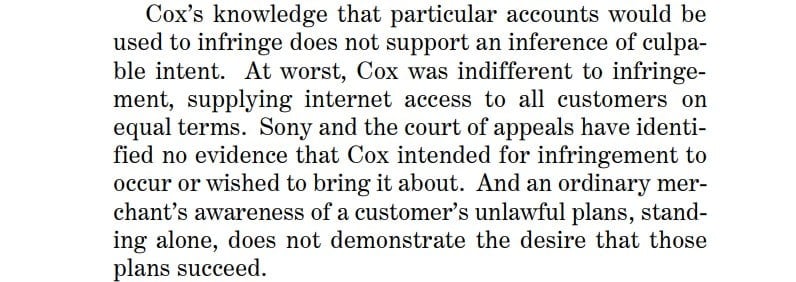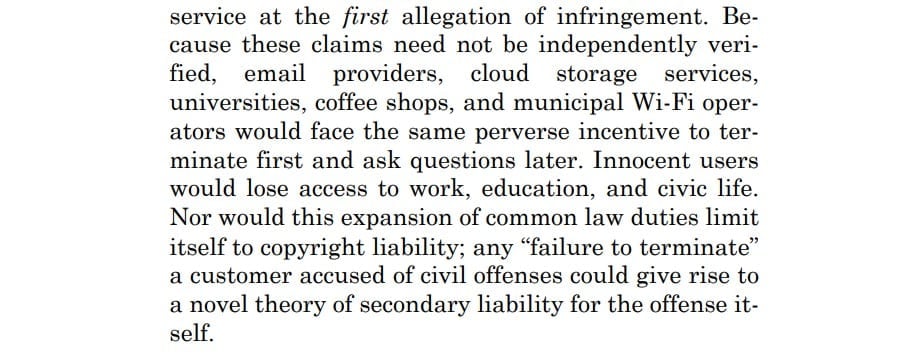 Nearly five years ago, a Virginia jury ordered Cox Communications to pay a billion dollars in damages to a coalition of record labels, including Sony and Universal.
Nearly five years ago, a Virginia jury ordered Cox Communications to pay a billion dollars in damages to a coalition of record labels, including Sony and Universal.
The jury concluded that the Internet provider was liable for the pirating activities of its subscribers, as it failed to terminate their accounts after multiple infringement notices.
The liability ruling was upheld at the Fourth Circuit Court of Appeals, prompting Cox to request a hearing at the Supreme Court, which formally accepted the case and received Cox’s opening brief last August.
In recent days, it became apparent that the Internet provider is not fighting the battle alone; there is support from a wide variety of interested parties, including the U.S. Government, which also backed Cox earlier this year.
U.S. Government Warns of Mass Terminations
The U.S. government, through the Office of the Solicitor General, filed an amicus brief supporting Cox’s position. The government’s decision to weigh in is significant; the Solicitor General’s office is seen as the tenth justice and its arguments are granted significant weight by the Supreme Court.
The government’s brief argues that the Fourth Circuit’s decision wrongly applied U.S. copyright law. By doing so, many people may be at risk of losing internet access, while companies such as Cox face broad copyright liability rulings.
The U.S. brief highlights that secondary liability requires “culpable intent” to facilitate infringement, not just a passive failure to act. The brief states that Cox’s services have substantial non-infringing uses, and its conduct, at worst, showed indifference to infringement, not a desire to facilitate infringement.

If the Fourth Circuit ruling is allowed to stand, then ISPs and other online services may be more inclined to take action following copyright complaints. That would affect innocent users and threaten universal internet access.
“Affirmance of the ruling below would create a substantial disincentive to ISPs’ provision of universal internet service. Terminations of service would adversely affect not only actual infringers, but also the potentially numerous non-infringing users of terminated accounts,” the U.S. brief reads.
The U.S. also sides with Cox’s view that mere knowledge of subscriber piracy does not constitute ‘willful’ copyright infringement, as the lower court suggested to the jury. Willful infringement requires proof that the defendant understood the illegality of their own conduct, not just that they knew their customers’ actions were unlawful, the brief reads.
Google, Amazon & Microsoft Back Cox
Cox’s case also receives support from a coalition of leading tech companies, including Google, Amazon, Microsoft, Mozilla, and Pinterest. They submitted a joint amicus brief warning that the Fourth Circuit’s ruling “threaten[s] all types of online service providers” with “overbroad and unpredictable liability rules”.
The tech companies argue that the lower court misinterpreted the DMCA’s safe harbor protections. These are intended to provide a layer of protection for service providers, but the court turned that upside down and transformed it into a “liability-creating mechanism” instead, the companies say.

Under the DMCA, online services enjoy safe harbor protection if they implement a proper repeat infringer policy. Not doing so makes Cox ineligible for safe harbor protections, but not automatically liable. In this case, the court concluded that Cox is liable for contributory copyright infringement because it failed to implement such a policy.
Similar to the U.S. position, the tech companies argue that “conscious, culpable conduct” is required to prove contributory infringement, not merely a failure to act.
The brief also points out that willful infringement requires actual knowledge of its own wrongdoing. The loose standard that was applied by the lower court opens the door to damages awards of $150,000 per work, which leads to “truly exorbitant damages,” they note.
Legal scholars, ISPs, rights groups, and others all back Cox
The U.S. Government and tech companies are not the only parties that have come out in support of Cox. Filings from a diverse array of fellow ISPs, digital rights groups, and legal scholars, all argue that the lower court’s decision is a dangerous expansion of copyright law that threatens to disrupt the fundamental nature of the internet.
Altice, AT&T, and Verizon are concerned about the real-world consequences of the ruling for the public, warning of potentially crippling damages awards that could shake up the industry.
“It threatens to saddle internet service providers with responsibility for virtually every bad act that occurs online. And it threatens those providers with massive liability if they do not carry out mass internet evictions,” the ISPs write.
The Electronic Frontier Foundation (EFF), along with the American Library Association and Re:Create, stressed the public policy implications. Their brief argues that the lower court’s ruling would cause ISPs to disconnect “innocent and vulnerable users” upon the “flimsiest of accusations”.
“If there was ever a case where the Court should act cautiously before expanding the scope of copyright contributory liability, it’s this one. Here, Defendant Cox is an Internet Service Provider (ISP), upon which millions of innocent users rely for internet access, a vital service in today’s society,” they write.
Digital rights organization Public Knowledge also weighed in, calling the existing precedent “ahistorical and contrary to public policy”. The group argues that the Fourth Circuit’s decision misinterprets the DMCA by treating its safe harbor conditions as a trigger for liability, creating a “perverse incentive to terminate first and ask questions later.”

Legal scholars Christopher Cotropia and James Gibson point out that holding Cox liable for its inaction, instead of its actions, is a dangerous precedent that could lead to liability findings for all sorts of mere conduit providers.
“By treating Cox’s passive provision of Internet access and data transmission as a knowing, material contribution to infringement, the Fourth Circuit collapsed the crucial legal distinction between conduits and hosts, extending contributory liability into an area where no court or legislature has ever placed it.”
Finally, X Corp., the parent company of Twitter, brought a unique perspective as a social media platform. Its brief argues that the lower court’s ruling would have a chilling effect on free expression.
“Declining to take away an important tool of expression from these ordinary Americans is not the kind of inaction that the doctrine of contributory or aiding-and-abetting liability was meant to reach,” X Corp writes.
“To allow a billion dollar award against a party that did not itself directly infringe, did not participate in the infringement, and did not financially benefit from infringing uses versus non-infringing uses by its subscribers is a grotesque distortion of the purposes of copyright law and common-law principles of liability.”
These briefs make it clear that this isn’t an ordinary case, but a landmark legal battle destined to shape the future of U.S. copyright law. However, these responses are just one side of the argument. The record labels are expected to file their reply brief next month. They will undoubtedly receive support from other rightsholders.
—
Copies of all the supporting amicus briefs mentioned in this article, plus some others that came in, are available below.
– United States (pdf)
– Google, Amazon.com, Microsoft, Mozilla and Pinterest (pdf)
– Law professor Charles Duan (pdf)
– Electronic Frontier Foundation et al. (pdf)
– Legal scholars Christopher Cotropia and James Gibson (pdf)
– Common Sense Copyright Coalition et al. (pdf)
– Public Knowledge (pdf)
– X Corp (pdf)
– Altice, AT&T and other ISPs (pdf)
– Computer & Communications Industry Association (pdf)
– The Copia Institute (pdf)
– ACLU et al. (pdf)
– Engine Advocacy (pdf)
– Joshua Moon and the United States Internet Preservation Society (pdf)
– American Intellectual Property Law Association (pdf)
– Intellectual Property Law Scholars (pdf)
– Internet Society (pdf)
– Grande Communications Networks (pdf)
From: TF, for the latest news on copyright battles, piracy and more.
Powered by WPeMatico
